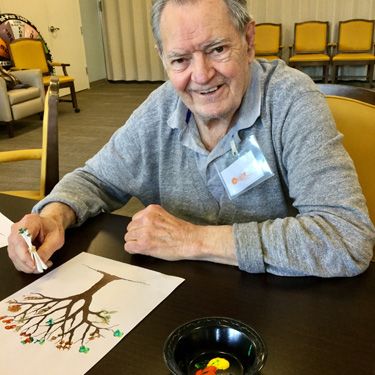
Activities of Daily Living (ADL’s) are just that; activities apart of our everyday life. They range from brushing our teeth, to walking with friends, all the way to catching up on current events over a cup of coffee. How we operate and the reasons behind why we do the things we do, is often taken for granted. For a family facing a dementia diagnosis, the “why” must be confronted when we find our loved one taking part in activities that no longer make sense, put them at risk, or when they are no longer able to perform ADL’s required to function independently. Maybe they are rushing out of bed at 3 in the morning to check on the roast in the oven. They may refuse to shower for the third day in a row because they “just showered this morning.” Or they may constantly get up from their chair because they have to pick up the kids from school. The why behind our behavior is most often confronted when the “why” stops making sense.
A big part of our job here at Insight is to give someone with a dementia diagnosis a “why,” or as we commonly refer to it, purpose. Our team of recreation therapists and activity professionals use the common motivations within all of us in crafting and implementing a structured calendar of exciting, and meaningful activities. These activities promote socialization, cognitive engagement, physical endurance and strength, in addition to self-expression and spiritual programs. We have the luxury of having a full time staff dedicated to brainstorming, personalizing and adapting purposeful activities. So what is the caregiver, alone, with someone with dementia to do without a team of professionals to plan out their day? Answer: Get Creative!
Merging your loved one’s past interests and current interests and abilities is important to engaging with them. Here are some programs we run at Insight that can be adopted at home:
Exercise
Many of us have found reasons to get active our whole lives. That does not have to stop because of a dementia diagnosis. Chair Exercise is a great way to engage a loved one who may be losing balance, or ability to walk. Set the exercise to their upbeat favorite music and get movin’! If your loved one is able to walk comfortably, establish a routine where you walk the same route at the same time of day. This routine creates a sense of comfort and allows both of you some fresh air together, and may even help decrease anxiety.
Can’t decide on music? Check out some playlists on Pandora or Spotify!
Cooking
Maybe your loved one cannot cook for themselves independently anymore, but that does not mean they are incapable of helping! Have them sort the silverware from the dishwasher, or set the table. Give them a simple task that they can take ownership of. Have them read the recipe aloud to you, or measure one of the ingredients. Whether it be tossing the salad, crushing walnuts, washing the vegetables, there are a variety of ways your loved one can contribute to a meal that you can share together!
Music
Access to the internet makes listening to our favorite artists that much easier! Who did your loved one love to listen to? What songs are meaningful to the both of you? Use that information and start a conversation. For example, if your loved one just loves Johnny Cash, listen to some of his favorite hits, talk about his contribution to music, his personal struggles and even watch some of his live performances on Youtube. Music allows us to pull memories to surface and even initiate a meaningful conversation about how that music has affected us. It can also lead to dancing, which in our book, is a wonderful thing!
Sorting
Sorting and matching is something we do all day without even knowing it. It is something that stimulates our cognition and something you can use at home with your loved very easily. Have them sort through magazines and clip out the coupons. Have them sort through the newspaper and clip out all the ads. If crosswords, or Sudoku is too difficult for your loved one, have them make a list for you. If they can’t write ask them to name all the fruits you need from the market, and then the vegetables and so on. Puzzle and matching games can also be really fun for those word game aficionados.
Insight Hint: If scrabble has become too difficult, have them sort the letters for you!
These are just a couple of things that can adapted at home to keep your loved one occupied. The key to running a great activity at Insight, or anywhere, is knowing your audience. We ask constantly; “How can we personalize it so this program so that it runs successfully?” Consider the time of day, the weather, and your loved one’s natural routine. Planning any sort of activity with your loved one requires you doing what you do every day; loving them, being patient with them and accepting who they are in this moment.
Author
Katelyn Sloan is the Marketing Director at Insight Memory Care Center.




